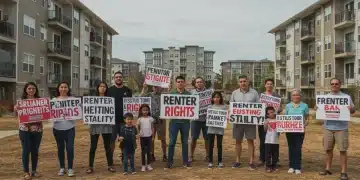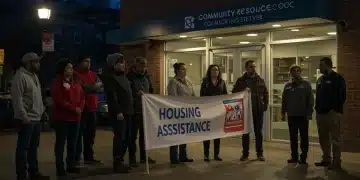Emergency Housing Assistance: What to Do Before Eviction in 30 Days

Emergency housing assistance is crucial if you’re facing eviction within 30 days; it involves understanding your rights, seeking immediate legal aid, and exploring available resources from government programs, non-profits, and community organizations to find temporary shelter and long-term housing solutions.
Facing eviction can be a stressful and overwhelming experience. If you’re dealing with an eviction notice and need housing within the next 30 days, understanding your options is critical. Emergency housing assistance: what to do if you’re facing eviction in the next 30 days is not just a phrase, it’s a roadmap to navigate a challenging situation.
Understanding the Urgency of Your Situation
When you receive an eviction notice, time is of the essence. The first step in seeking emergency housing assistance is to understand exactly what the notice means and the timeline you’re working with.
Decoding the Eviction Notice
An eviction notice will contain important information. Key elements include:
- The reason for the eviction.
- The date by which you must leave the property.
- Information on how to contest the eviction, if you believe it’s unjustified.
Understanding these details is crucial for planning your next steps effectively. Ignoring the notice won’t make the problem go away; it will only make it harder to resolve.
Assessing Your Situation
Take a moment to evaluate your financial situation. Consider these factors:
- Can you realistically catch up on rent within the stipulated timeframe?
- What immediate funds are available to you?
- Are there any discrepancies in the eviction notice that could buy you more time?
Facing the situation head-on starts with a clear, honest assessment of your circumstances.
Quickly grasping these initial details sets the stage for seeking appropriate assistance. With a clear understanding of your situation, it’s time to turn to available legal and community resources to avoid becoming homeless.
Immediate Legal Assistance and Tenant Rights
Navigating the legal aspects of an eviction can be complicated. Seeking legal help immediately is essential to understand your rights and options. Many organizations provide free or low-cost legal services for tenants facing eviction.

Finding Free Legal Aid
Several organizations offer free legal services to those facing eviction. Here are a few resources:
- Local Legal Aid Societies: Almost every state has a legal aid society that provides free legal assistance to low-income individuals.
- Pro Bono Attorneys: Some attorneys offer their services for free as part of their professional responsibility.
- Tenant Rights Organizations: These groups specialize in helping tenants understand their rights and can provide legal advice or representation.
Understanding Your Tenant Rights
Knowing your rights as a tenant is crucial when fighting an eviction. These rights can vary by state and even by city, but some common protections include:
- Proper Notice: Landlords must provide adequate notice before filing for eviction.
- Habitability: Landlords are typically required to maintain a safe and habitable living environment.
- Protection Against Discrimination: Landlords cannot evict tenants based on race, religion, gender, or other protected characteristics.
Understanding these fundamental rights will help you navigate the eviction process more effectively.
Securing legal guidance and comprehending your tenant rights can significantly influence the outcome of your eviction case. With legal support in progress, examining available housing assistance programs becomes the next essential step.
Exploring Government Housing Assistance Programs
Several government programs offer assistance to those facing housing instability and eviction. These programs can provide financial aid, temporary housing, and other resources to help you get back on your feet.
HUD (Housing and Urban Development)
HUD provides resources for finding affordable housing and rental assistance programs. Some key HUD programs include:
- Section 8 Housing Choice Voucher Program: This program provides rental assistance to eligible low-income families, enabling them to afford decent, safe, and sanitary housing.
- Public Housing: HUD provides funding to local housing agencies that manage public housing units for low-income families, seniors, and people with disabilities.
Emergency Solutions Grants (ESG)
These grants are allocated at the state level to help individuals and families quickly regain housing stability. ESG funds can be used for:
- Emergency Shelter: Providing temporary shelter for those experiencing homelessness.
- Rapid Re-Housing: Helping individuals and families move into permanent housing as quickly as possible.
- Homelessness Prevention: Offering assistance to those at risk of becoming homeless, including eviction prevention services.
Engaging with these government programs can open doors to immediate and long-term housing solutions. Each program has specific requirements and application processes, so be prepared to provide necessary documentation.
By navigating these government assistance options, individuals facing eviction can find a lifeline. Simultaneously, it’s wise to explore community organizations and non-profits that offer localized, tailored support.
Leveraging Community Organizations and Non-Profits
In addition to government aid, numerous community organizations and non-profit groups provide essential support to individuals and families facing emergency housing assistance. These entities often offer unique programs tailored to local needs.
Local Homeless Shelters
Homeless shelters are often the most immediate resource when one is facing eviction.
- They provide temporary shelter, offering a safe place to stay while pursuing more permanent solutions.
- Many shelters also offer case management services to help residents find housing, employment, and other needed resources.
Local Charities
Many cities have local charities that provide emergency assistance with rent, utilities, and other essential needs.

- These organizations may offer one-time financial assistance to help prevent eviction.
- They can also connect you with additional resources in the community, such as food banks and clothing closets.
Religious Organizations
Local churches, synagogues, and mosques often provide assistance to those in need.
- Some religious organizations have dedicated programs to help families facing eviction.
- They may offer financial assistance, counseling, and other support services.
These organizations provide crucial immediate relief and long-term support to those affected by housing instability and loss. By engaging multiple support systems, individuals can maximize their chances of finding stable housing and avoiding prolonged homelessness.
These community resources provide immediate and practical support to individuals in crisis. Understanding their role and actively seeking their assistance forms an integral part of a comprehensive approach to combating eviction.
Creating an Action Plan
Once you’ve explored your options and gathered information, it’s time to create an action plan. This plan should outline the steps you’ll take to address the eviction notice, find emergency housing assistance, and secure long-term housing. Planning can make all the difference.
Prioritize Immediate Tasks
Address the eviction notice immediately. Here are some immediate actions:
- Consult an attorney to understand your rights and options.
- Gather all relevant documents, including the eviction notice, lease agreement, and any correspondence with your landlord.
- Contact local housing agencies and community organizations to inquire about available assistance programs.
Develop a Budget
Create a budget to track your income and expenses. A realistic budget can help you identify areas where you can cut back and save money to cover housing costs.
Start Looking for Housing
Begin your search for a new housing option as soon as possible. Consider:
- Affordable housing complexes.
- Rental assistance programs.
- Shared housing options.
By creating and implementing a comprehensive action plan, you can manage the eviction process more effectively and work towards achieving housing stability.
With a solid action plan in place, the path to securing housing assistance becomes more manageable, fostering resilience during an incredibly challenging time.
Preventive Measures and Long-Term Stability
While addressing the immediate crisis is critical, taking preventive measures and focusing on long-term stability can help you avoid future housing emergencies. Understand what resources are available to you and how you can take back control.
Financial Planning
Good financial planning is key to housing stability.
- Create a budget: A budget helps you track your income and expenses, identifying areas where you can save.
- Build an emergency fund: An emergency fund can provide a financial cushion to cover unexpected expenses, like medical bills or car repairs.
- Manage debt: High levels of debt can strain your finances, increasing your risk of eviction. Work to reduce your debt by making regular payments and avoiding new debt.
Tenant Education Programs
Several organizations offer tenant education programs that teach you about:
- Your rights and responsibilities as a tenant.
- How to maintain a positive relationship with your landlord.
- How to resolve disputes with your landlord.
Maintaining Housing
Take an active interest in maintaining stable housing. Some simple steps can include:
- Communicate openly with your landlord, reporting any issues or concerns promptly.
- Adhere to the terms of your lease agreement.
- Respect the community and neighbors.
By investing in financial stability and housing upkeep, you can mitigate the risk of eviction and secure a stable future for yourself and your family. Learning from the present crisis sets you on a path to lasting housing security.
| Key Point | Brief Description |
|---|---|
| ⏰ Understand Urgency | Assess eviction notice, timeline, and financial state. |
| ⚖️ Legal Assistance | Seek free legal aid to navigate tenant rights. |
| 🏢 Government Programs | Explore HUD and ESG for housing and rent aid. |
| 🤝 Community Support | Connect with local shelters, charities, and religious bodies. |
Immediately consult with a legal aid service or tenant rights organization to understand your rights and the validity of the notice. Gather all relevant documents. Explore programs like HUD’s Section 8, Emergency Solutions Grants (ESG), and local charities for rent assistance. Contact 211, a helpline. If you believe the eviction is discriminatory, contact a fair housing agency or legal aid immediately. Document all interactions with the landlord. Community organizations and non-profits often offer emergency shelter, food assistance, and case management services for housing support. Create a budget, build an emergency fund, manage debt, and participate in tenant education programs to understand your rights and responsibilities. Facing eviction is a daunting experience, but knowing your rights and the resources available can make a significant difference. By taking immediate action, seeking legal assistance, exploring government programs, and connecting with community organizations, you can find emergency housing assistance and work toward long-term housing stability.
▼
▼
▼
▼
▼Conclusion





